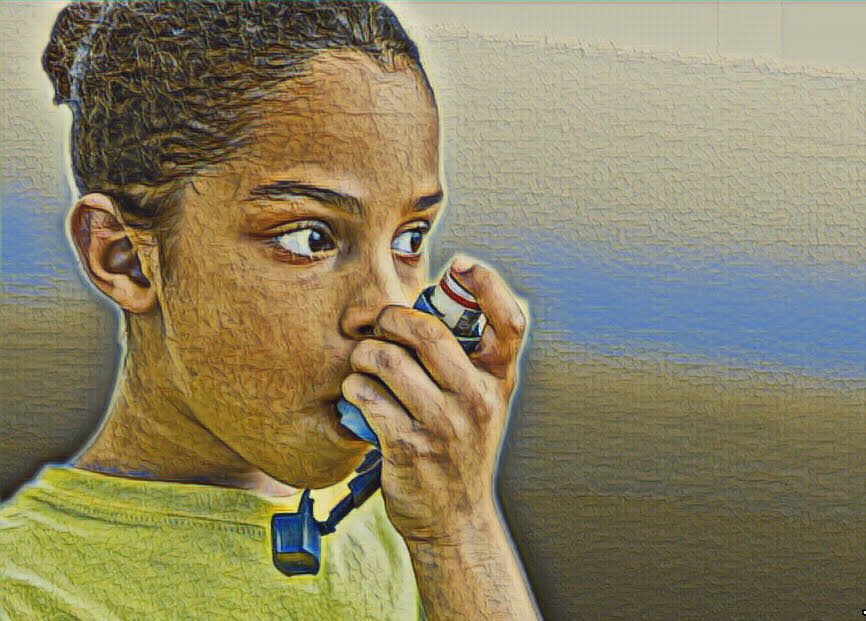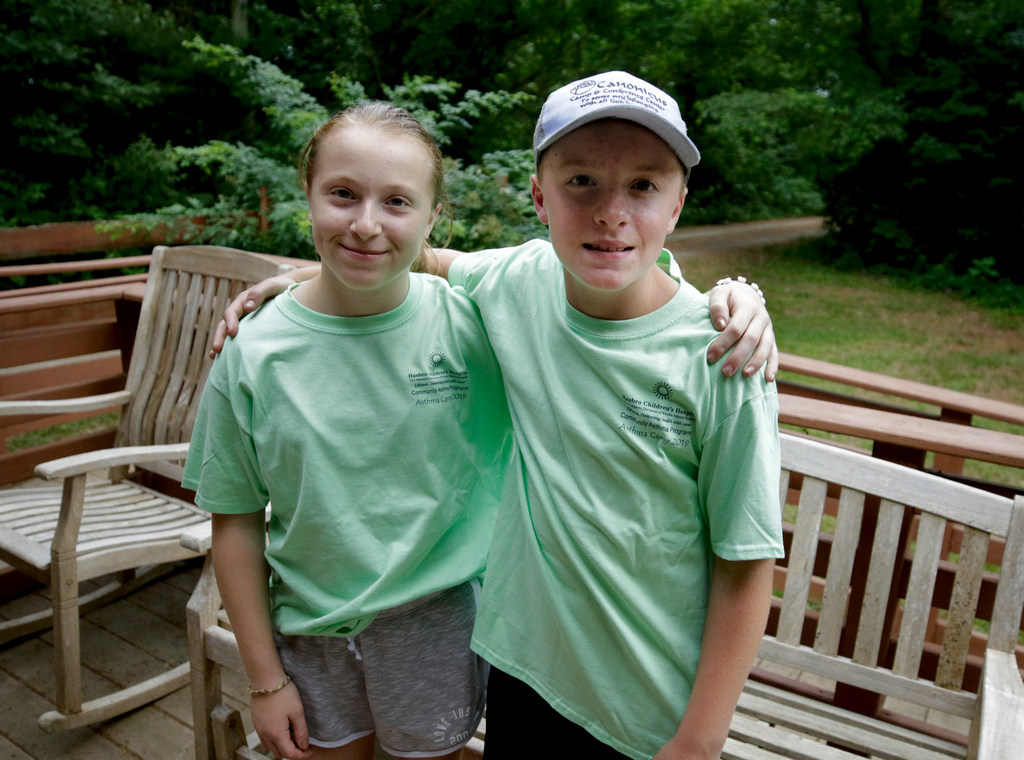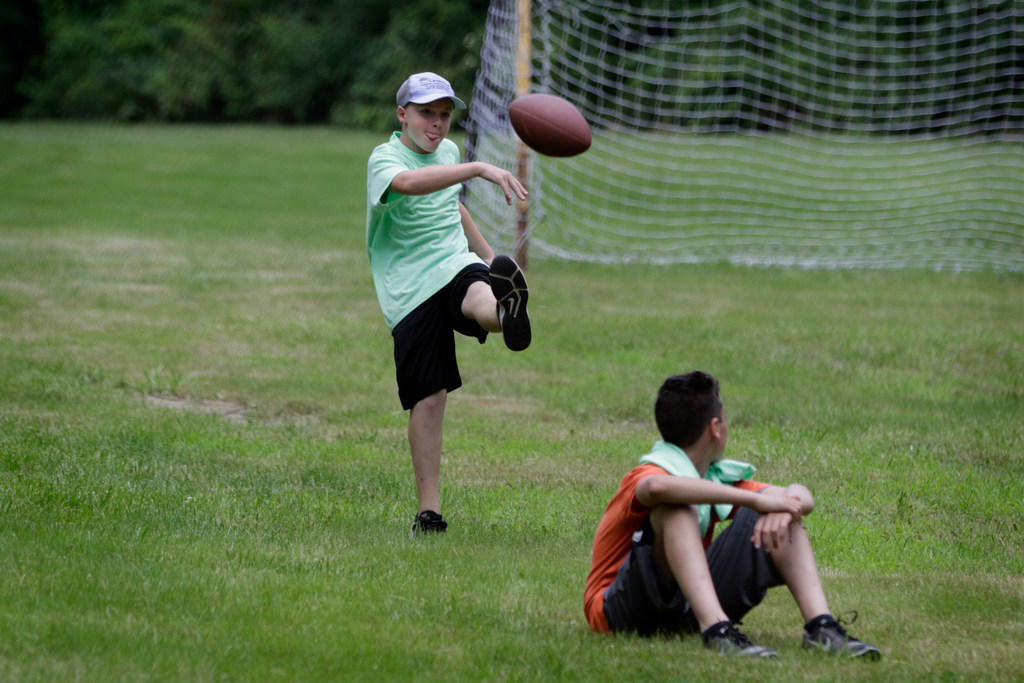
A climate of suffering:
Kristen Fountaine, 11, has lived with severe asthma since birth. Medications and precautions help, but they do not prevent periodic hospitalizations and asthma attacks, when breathing becomes a frightening and potentially life-threatening struggle.
Summer is treacherous: The higher the temperature, the worse asthma can become.
“The hot weather is harder for me,” said Kristen, who lives in Cranston. “It’s like you’re being squeezed.”
So she and twin brother Thomas, who also lives with the condition, last month attended Asthma Camp, a free overnight program on the grounds of Canonicus Camp and Conference Center run by Hasbro Children’s Hospital and the CVS/pharmacy Draw A Breath Program. Supervised by a medical staff, children participate in outdoor and indoor activities while learning “how to take an active role in the management of their asthma,” according to the hospital.
Young as they are, the Fountaine twins have heard about climate change.
“The earth is kind of getting hotter and hotter,” Kristen said.
And her health has been affected.

The impact of climate change on well-being lies not in some distant future.
People are suffering now, in Rhode Island as across the nation, according to Gregory Wellenius, director of the Brown University Center for Environmental Health and Technology, associate professor of epidemiology at Brown's School of Public Health, and a contributing author to the landmark Fourth National Climate Assessment, which warns that “human health and safety … in communities across the U.S. are increasingly vulnerable to the impacts of climate change.”
“For too long,” Wellenius said, “we framed this as a problem either far away in time or far away in space, like this is about polar bears or penguins or small Pacific Islands. It is those things, but it's much more important because it’s also your kids, your families, your communities,” here in the state, as elsewhere.
“We can look at Rhode Island," Wellenius said, "with its 400 miles of coastline and a lot of risk of flooding, even when we don’t have coastal storms, just heavy rainfall events,” such as the historic flood of 2010. That natural disaster, the sort that will occur more frequently, ruined homes and businesses and contributed to an increase in mold, which can have deleterious effects on health.
“And we have heat,” Wellenius said. “Since about 1960, when T.F. Green started the weather station, there are now 21 more days of high heat every summer today than then.”
The health effects?
“At least some increased risk of death and some increased risk of visiting the emergency department,” the disease specialist said. “There's a higher risk of hospitalization on very hot days broadly for everybody, but we think there are some particularly susceptible individuals, including people with asthma, people with COPD, the elderly.” Also, those with cardiovascular disease.
And with ozone levels continuing to rise, Wellenius said, “your kid is more likely to develop asthma if they live in a high-ozone environment. On days of high ozone, they're more likely to have an asthma attack.”
Climate change has also intensified the detrimental effects of pollen, according to Wellenius and his post-doctoral fellow Kate Weinberger, who recently became an assistant professor at the University of British Columbia’s School of Population and Public Health.
“Warmer winters have been linked to advances in the start date of the pollen season,” Weinberger said. Regarding ragweed, a notorious allergy trigger, “there's some evidence that increased concentrations of CO2 have a direct impact on the amount and potency of the pollen,” she said.
“So it's more pollen, and that pollen is more allergenic,” Wellenius said. “So if you think your allergies are getting worse, it's probably because they are.”
Climate change likely also negatively affects mental health, the scientists assert. Wellenius pointed to the aftermath of Rhode Island's historic 2010 flood.
“Imagine that it happens again,” he said. “Having your house flooded is traumatic once — but having your house flooded a second time is devastating to people. In relation to other sorts of severe natural disasters, there has been a documented rise in things that look like PTSD and increased rates of depression.”
Despite all this, Wellenius urges people not to be discouraged.
“There's really no disagreement that these things are happening and that it is having a profound impact on our lives,” he said. “But there's also no doubt that there's hope, that this is entirely a solvable problem, that we're already making great strides to avert the worst of the consequences.”
He cites where he lives, the city of Newton, Massachusetts, as one of many examples of where progress is being made. Mayor Ruthanne Fuller has instituted a series of measures confirming the city’s “commitment to preparing Newton for the impacts of climate change through both mitigation and resiliency planning,” according to the city’s website.
Hasbro Children’s Hospital researchers and Brown professors Daphne Koinis-Mitchell and Elizabeth McQuaid, two of the professionals involved in Asthma Camp and other Lifespan programs, have studied the effects of weather on children such as Kristen and Thomas Fountaine.
Both extreme heat and extreme cold can intensify suffering, as can excessive humidity, depending on the child, they have concluded.
“No two kids are alike,” Koinis-Mitchell said.
Schools differ, too.
Some aging buildings have heating systems with thermostats essentially stuck on high, the sustained heat potentially harmful, she and McQuaid have found. Some have windows that cannot be opened to permit proper ventilation. Many have no air conditioning to mitigate the unhealthy effects of heat spells. Several schools in Providence, subject of the recent scathing Johns Hopkins University report, fit this profile, as do schools in other districts.
“Certainly the environmental conditions of the school play a role” in exacerbating asthma, Koinis-Mitchell said.
Mold, which can aggravate the condition, is also an issue in some schools, residences and other buildings. And the downpour from extreme storms, which are becoming more frequent as the planet warms, fuels growth of the fungus — inside structures and also outside, meaning escape may be impossible.

Children with asthma are not the only ones at risk.
“People with mold allergies may have more severe reactions,” states the Centers for Disease Control and Prevention. “Immune-compromised people and people with chronic lung illnesses, such as obstructive lung disease, may get serious infections in their lungs when they are exposed to mold.” The elderly may also suffer disproportionately.
“With indoor mold, often families don't know exactly what they need to do to manage it, or they're in housing where they don't have control — some kinds of public housing, for example,” said McQuaid. Unseen, mold can proliferate inside walls and floors and even modest attempts to combat it can backfire, the scientist said.
“Strong cleaners can be a trigger” to asthma, McQuaid said.
Another complication may arise from behaviors changed by extreme temperatures: when it’s really hot, people stay inside more. Depending on the residence, that may mean increased exposure to mold — and other toxins, including rodent and cockroach antigens. Here, as in other health outcomes, disparities among race, income, zip code and other factors play a role.
“There are some theories that the increasing prevalence of asthma over the past 20 to 30 years has to do with increased exposure to indoor allergens,” said McQuaid.
And there could be yet another unhealthy result: higher rates of childhood obesity as excessive heat limits outdoor play, aka exercise.
“Obesity is highly co-morbid with asthma,” Koinis-Mitchell said. “Fears of going outside keep a lot of kids from playing outside. Bad weather [along with worries about street crime] is also a risk factor for kids staying inside and being less active.”
Rhode Island child asthma statistics
Percent of the total U.S. adult population with asthma
Top five
- New Hampshire - 13.2 percent (142,205 adults)
- West Virginia - 12.7 percent (182,240 adults)
- Rhode Island - 12.3 percent (103,853 adults)
- Puerto Rico - 12.1 percent (334,638 adults)
- Vermont - 11.8 percent (59,012 adults)
Source: Centers for Disease Control and Prevention
When they arrived at Asthma Camp, the Fountaine twins and the 25 other children from the greater Providence area at this summer's session were tested.
“On the first day,” Thomas said, “they pushed you to the limit because they want to see what the children are capable of and what they’re not capable of.”
Individualized plans were set and then the fun — and learning — began.
“It gives us an opportunity to exercise,” Kristen said. “But also they teach us how to control our asthma and how to know when to take your inhaler and when you don't need it and the difference between your everyday one and the one you need for ‘rescue.’ ”
Kristen remembers the summer of 2018, fourth hottest on record in Rhode Island, with August going in the books as the hottest August ever.
“It was hotter last year,” Kristen said. “Very hot.”
Predictably, the excessive heat exacerbated her asthma.
The Providence Journal delivers accurate, timely news about the moments that matter most. To receive stories like this one in your inbox, sign up here.
SubscribeOn the last day of camp, Alicia and Robert Fountaine drove down from Cranston to pick up their children.
Robert described Kristen’s limitations in hot weather.
“She can't stay out as long as Tommy,” he said. “If they’re playing basketball or riding their bikes, she knows enough to come and take a break, have water, take a puff if she needs it. The higher temperatures are not good for her. And in humidity, she doesn't breathe well at all.”
The twins went home armed with practical knowledge.
“Don’t really push it, because the more that you do, the more your asthma is going to get worse,” said Thomas.
Said his sister: “A while back, I was in the hospital with my asthma really bad, and after I came out a couple days later, I was nervous because I don't want to get the heavy breathing. But you have to be able to have fun when you have asthma. You just have to know how to control it.”